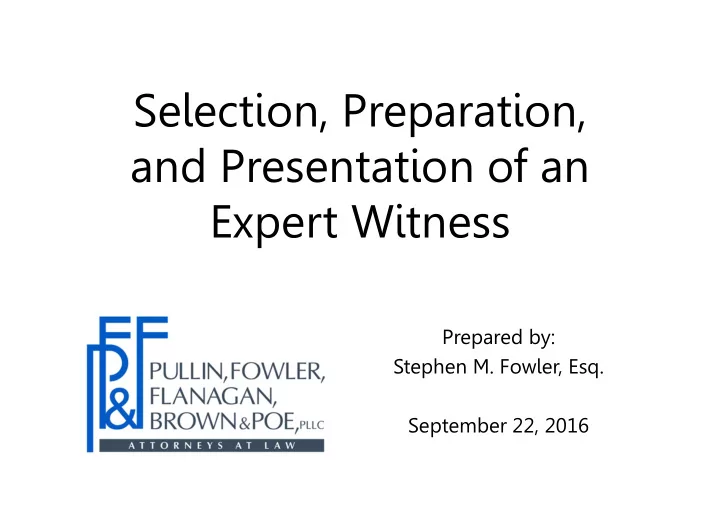

Selection, Preparation, and Presentation of an Expert Witness Prepared by: Stephen M. Fowler, Esq. September 22, 2016
First things first… � A few thoughts on not being in an accident � Charts – Federal Motor Carrier Safety Administration (FMCSA) � You are all doing a good job!
� Accidents involving a fatality are down from over 4000 per year in 1975 to 3600 per year in 2014, despite an increase of miles driven from 1.3 million miles to over 3 million miles.
� We’re doing even better in West Virginia. � 2004 – 61 fatal crashes in WV � 2014 – 26 fatal crashes in WV
Top reasons for accidents: � Driver error � Load shift � Poor maintenance
Less obvious: 1. Know and study your route. � Identify problem areas � Rt. 35 � Turnpike � Known traffic levels � Road work � Modern GPS / WAZE app
Less obvious (continued): 2. Vulnerable times – dawn and dusk 3. Drive defensively – all other drivers are out to kill you. Those that seemingly follow traffic rules are just lulling you into a false sense of security. Anticipate bad moves. 4. When all else fails, do what you can for your own safety and that of others. � 911 � First Aid � Road workers
Experts � Suit – need an expert � Allowed to render opinion testimony about how well your company follows the rules, and how your driver was not at fault.
Choosing an expert � Your advocate � Experienced � Qualified � Able to stand up to cross-examination � Interview them, get references from others
Retaining an expert � Make sure it’s early in the case � Get them all the materials � View truck / car / accident scene � Avoid cross-examination problems by overpreparing � Depositions � Records � Medical records – condition of plaintiff (don’t want to seem disinterested or callous)
Recommend
More recommend